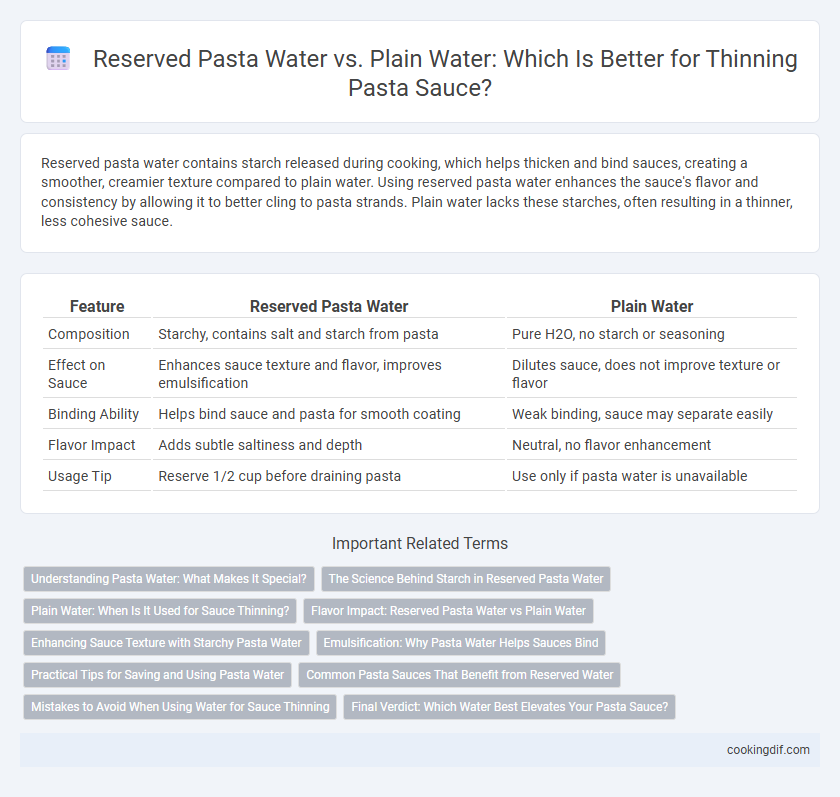Reserved pasta water contains starch released during cooking, which helps thicken and bind sauces, creating a smoother, creamier texture compared to plain water. Using reserved pasta water enhances the sauce's flavor and consistency by allowing it to better cling to pasta strands. Plain water lacks these starches, often resulting in a thinner, less cohesive sauce.
Table of Comparison
| Feature | Reserved Pasta Water | Plain Water |
|---|---|---|
| Composition | Starchy, contains salt and starch from pasta | Pure H2O, no starch or seasoning |
| Effect on Sauce | Enhances sauce texture and flavor, improves emulsification | Dilutes sauce, does not improve texture or flavor |
| Binding Ability | Helps bind sauce and pasta for smooth coating | Weak binding, sauce may separate easily |
| Flavor Impact | Adds subtle saltiness and depth | Neutral, no flavor enhancement |
| Usage Tip | Reserve 1/2 cup before draining pasta | Use only if pasta water is unavailable |
Understanding Pasta Water: What Makes It Special?
Pasta water contains starch released from the noodles during cooking, which acts as a natural thickener and emulsifier for sauces, enhancing their texture and helping them cling better to the pasta. Unlike plain water, reserved pasta water has a slightly salty flavor and a viscous quality that integrates with oil and cheese, creating a creamy, glossy finish without diluting the sauce. Utilizing pasta water elevates the overall dish by harmonizing flavors and improving sauce consistency.
The Science Behind Starch in Reserved Pasta Water
Reserved pasta water contains a high concentration of gelatinized starch released from the pasta during boiling, which acts as a natural thickener and emulsifier in sauce preparation. This starch-rich water improves sauce texture by binding fat and water molecules, resulting in a smooth, cohesive consistency that plain water cannot achieve. Using reserved pasta water instead of plain water enhances flavor integration and prevents sauces from becoming too watery or separated.
Plain Water: When Is It Used for Sauce Thinning?
Plain water is used for sauce thinning primarily when the sauce requires dilution without altering its flavor or consistency, such as in light tomato sauces or broths. It helps to adjust the sauce's texture when pasta water is unavailable or when a neutral thinning agent is preferred. Using plain water avoids adding starch, which can affect the sauce's body and mouthfeel compared to reserved pasta water.
Flavor Impact: Reserved Pasta Water vs Plain Water
Reserved pasta water contains starches released from the pasta during cooking, which helps thicken and emulsify sauces, enhancing their texture and richness. Unlike plain water, it adds subtle flavor and improves sauce adherence to the pasta, resulting in a more cohesive and flavorful dish. Using reserved pasta water preserves the intended taste profile by maintaining the sauce's balance between creaminess and seasoning.
Enhancing Sauce Texture with Starchy Pasta Water
Starchy pasta water contains gelatinized starch released during cooking, which acts as a natural emulsifier to thicken and bind sauces more effectively than plain water. Using reserved pasta water improves sauce texture by creating a smooth, velvety consistency that clings better to pasta strands, enhancing flavor distribution. Plain water lacks these starches, resulting in thinner, less cohesive sauces that fail to achieve the same richness and mouthfeel.
Emulsification: Why Pasta Water Helps Sauces Bind
Pasta water contains starch released from the pasta during cooking, acting as a natural emulsifier that helps sauces bind smoothly to noodles. The starch molecules in reserved pasta water create a creamy texture by stabilizing the mixture of oil and water components in the sauce. Using plain water lacks this emulsifying property, often resulting in a thinner, less cohesive sauce that fails to cling properly to the pasta.
Practical Tips for Saving and Using Pasta Water
Pasta water contains starches released during cooking, making it an ideal ingredient for sauce thinning and enhancing texture compared to plain water. Always reserve a cup of pasta water before draining, as its slightly thickened consistency helps bind sauces and pasta more effectively. Use the reserved water gradually to adjust sauce consistency and achieve a creamy, cohesive finish without diluting flavor.
Common Pasta Sauces That Benefit from Reserved Water
Reserved pasta water contains starch released during cooking, making it ideal for thinning sauces like Alfredo, carbonara, and cacio e pepe by enhancing creaminess and helping the sauce adhere better to the pasta. Plain water lacks these starches, so it dilutes rather than enriches the sauce, resulting in a thinner texture and less flavor integration. Sauces relying on emulsification and thickening, such as pesto and tomato-based sauces, particularly benefit from reserved pasta water to achieve optimal consistency and mouthfeel.
Mistakes to Avoid When Using Water for Sauce Thinning
Using plain water instead of reserved pasta water for sauce thinning often results in diluted flavors and a lack of sauce cohesion. Reserved pasta water contains starches and salts that help emulsify the sauce, enhancing texture and binding it to the pasta. Avoid adding too much water at once to prevent a watery sauce; gradually incorporate reserved water to maintain optimal consistency.
Final Verdict: Which Water Best Elevates Your Pasta Sauce?
Reserved pasta water is rich in starch from cooking, providing a silky texture and enhanced sauce adherence that plain water cannot replicate. Using reserved pasta water helps emulsify and thicken sauces naturally, making it the superior choice for thinning and elevating pasta dishes. Opting for reserved pasta water ensures maximum flavor integration and a professional-quality sauce finish every time.
reserved pasta water vs plain water for sauce thinning Infographic

 cookingdif.com
cookingdif.com